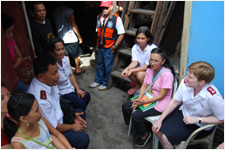Learning
Faith-Based Facilitation can be used in many ways to build deeper relationships. In this case study learning takes place through a well-facilitated team visit including a significant time of reflection related to the FBF process. This story shows the impact of a programme-to-programme visit. It also shows how making such links can help both the local team and a visiting facilitation team in building confidence and transferring learning.
The Issue
 A small community in South East Asia, like many communities in the world, has a fairly serious set of health problems, many of which are related to obesity and Type 2 diabetes. There is a small Salvation Army hall in the village and some of the women who met there regularly began to talk with each other about the problem.
A small community in South East Asia, like many communities in the world, has a fairly serious set of health problems, many of which are related to obesity and Type 2 diabetes. There is a small Salvation Army hall in the village and some of the women who met there regularly began to talk with each other about the problem.
Basic healthcare was available for those whose diabetes had been diagnosed, but there was not very much in the way of supportive work or health education. Amara, who had recently returned to the village and joined the Salvation Army corps (church) there was very keen that members of the local corps should help in this work. While living in another area, Amara had cared for her mother through the later stages of diabetes. She had learnt a lot from the hospital she had attended with mother about the causes of diabetes and how to prevent it. She explained to the other women about the dangers of a diet high in fat, salt and sugar. However, she found that trying to persuade people to change their eating habits is very difficult!
» Find out how Amara, along with a visiting facilitator, used the Faith-Based Facilitation process and tools
